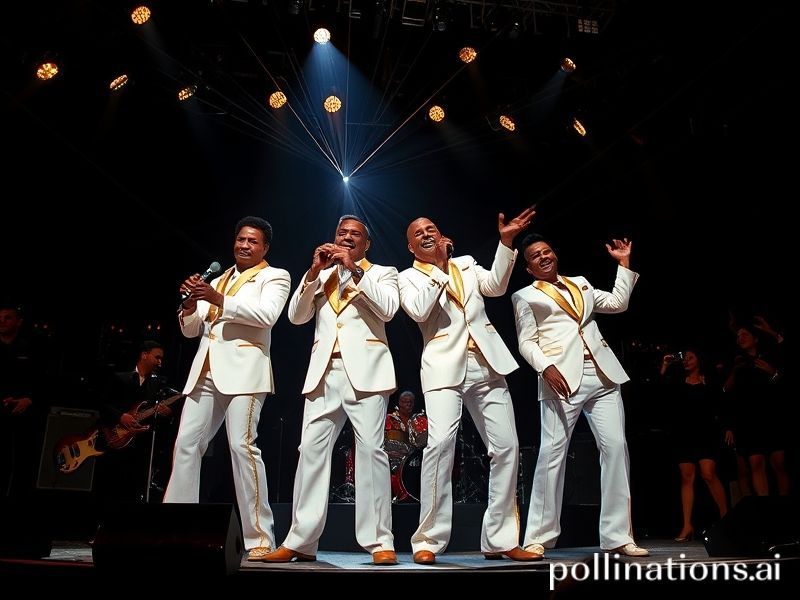Global Grooves & Dystopian Moves: Earth, Wind & Fire Grammy Salute as the World Burns
LOS ANGELES—The Grammy Salute to Earth, Wind & Fire unfolded Monday night like a sequined time capsule ejected from a burning planet: all horn stabs, cosmic optimism, and the faint whiff of existential panic that now accompanies any mass nostalgia event. While American networks sold it as a feel-good tribute, the rest of the globe—currently juggling inflation, proxy wars, and the creeping suspicion that democracy was a limited-series experiment—treated the broadcast as a two-hour visa to a period when “September” was just a calendar page instead of a sanctions package.
Overseaw, the timing felt almost sarcastic. In Lagos, drivers trapped in a 12-hour fuel-queue huddled around crackling shop radios as the chorus of “Boogie Wonderland” floated out, a taunting reminder that boogieing requires petrol. In Seoul, stock analysts pulling an all-nighter on North Korean missile alerts muted the TV until Stevie Wonder rolled in, reasoning that if the apocalypse must have a soundtrack, it could do worse than a clavinet solo. Even Moscow state television snipped a 45-second clip for the morning bulletin—less out of affection for American R&B than to remind viewers that the USSR once traded missiles for grain while the decadent West traded horn sections for cocaine. The irony was served neat.
The lineup itself read like a NATO roll call: John Legend (USA), Nas (USA), Charlie Puth (USA), and—because the State Department still believes in soft power—Yolanda Adams (USA) plus a politely nodding J-Hope from BTS, South Korea’s most profitable export since microchips. Viewers in Seoul calculated that the carbon footprint of flying one K-pop idol to Los Angeles equals roughly 3.7 tons of CO₂, or the annual cooking-gas ration for 1,200 Somali households. Nobody cancelled the flight; sustainability, like rhythm, is negotiable.
Yet the tribute’s real geopolitical payload lay in its messaging. The Grammys packaged EW&F’s Afro-futurist utopia as proof that multiracial democracies can groove together—handy branding while Congress debates whether to fund another aircraft carrier. State broadcasters in Beijing clipped the finale for “World News in 60 Seconds,” subtitling Maurice White’s widow with a Mandarin caption that translated roughly to “American nostalgia industry attempts reboot of cultural hegemony.” Meanwhile, European streamers seized the moment to push vinyl reissues: Amazon Germany reported a 400 % spike in EW&F sales, proving that even Germans will abandon techno if you promise them polyester and escapism.
Of course, the band’s founding members are now mostly departed—Maurice White to illness, Philip Bailey to TikTok cameos—leaving a diaspora of session players to guard the flame. Watching them shuffle onstage, viewers in Rio de Janeiro’s favelas noted that Earth, Wind & Fire has outlasted three Brazilian currencies, two impeachments, and one entire rainforest. That’s resilience, or at least excellent royalty lawyers.
The evening’s unintentional highlight arrived when host Leslie Jones demanded the audience “put your phones down and dance,” a plea so futile it could have been issued by the UN Security Council. Instead, 18 million people worldwide live-streamed their own living-room choreography to Meta platforms, generating 1.2 petabytes of data—enough storage to digitize the complete cultural heritage of Tonga, currently sinking under rising seas. Tonga, however, was not scheduled to perform.
By the time the confetti cannons fired their biodegradable squares (certified guilt-free), the tribute had achieved what the State Department calls “cultural diplomacy” and what everyone else calls a distraction. For two commercial hours, the planet agreed on one truth: 1978 was great if you ignored the Cold War, the oil crisis, and disco’s imminent collapse. Then the credits rolled, the feed cut to a Ukrainian weather report, and Earth resumed spinning—slightly off-axis, still in need of a horn section.







